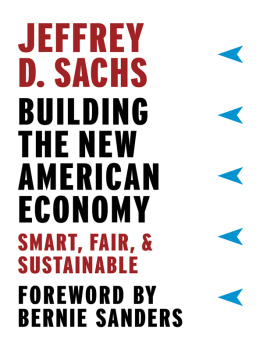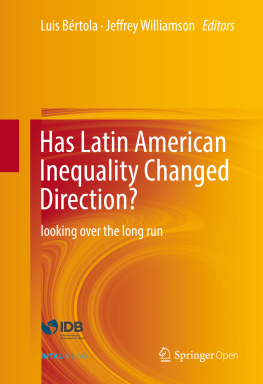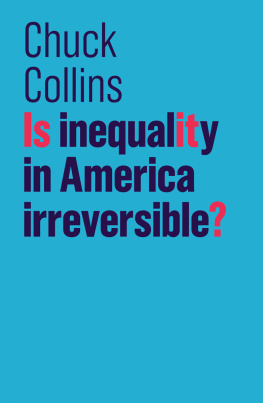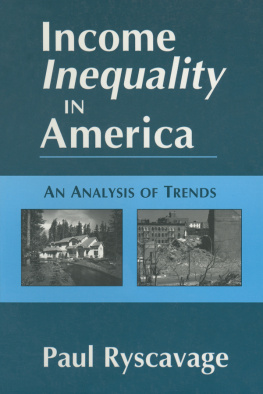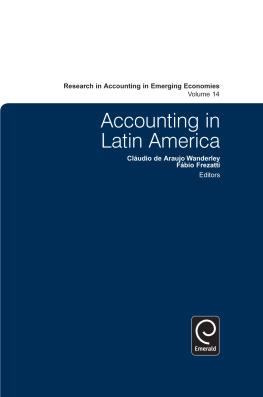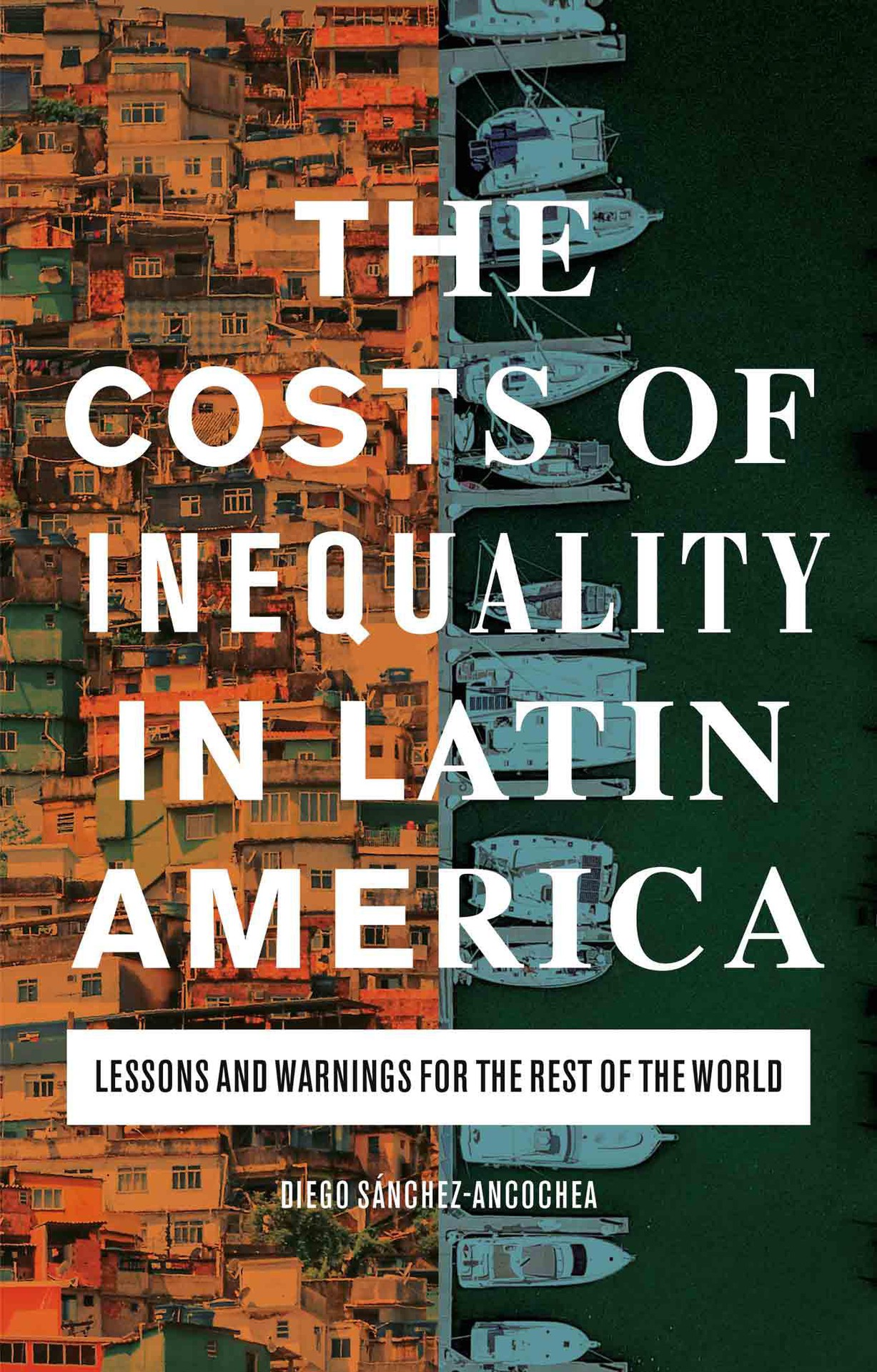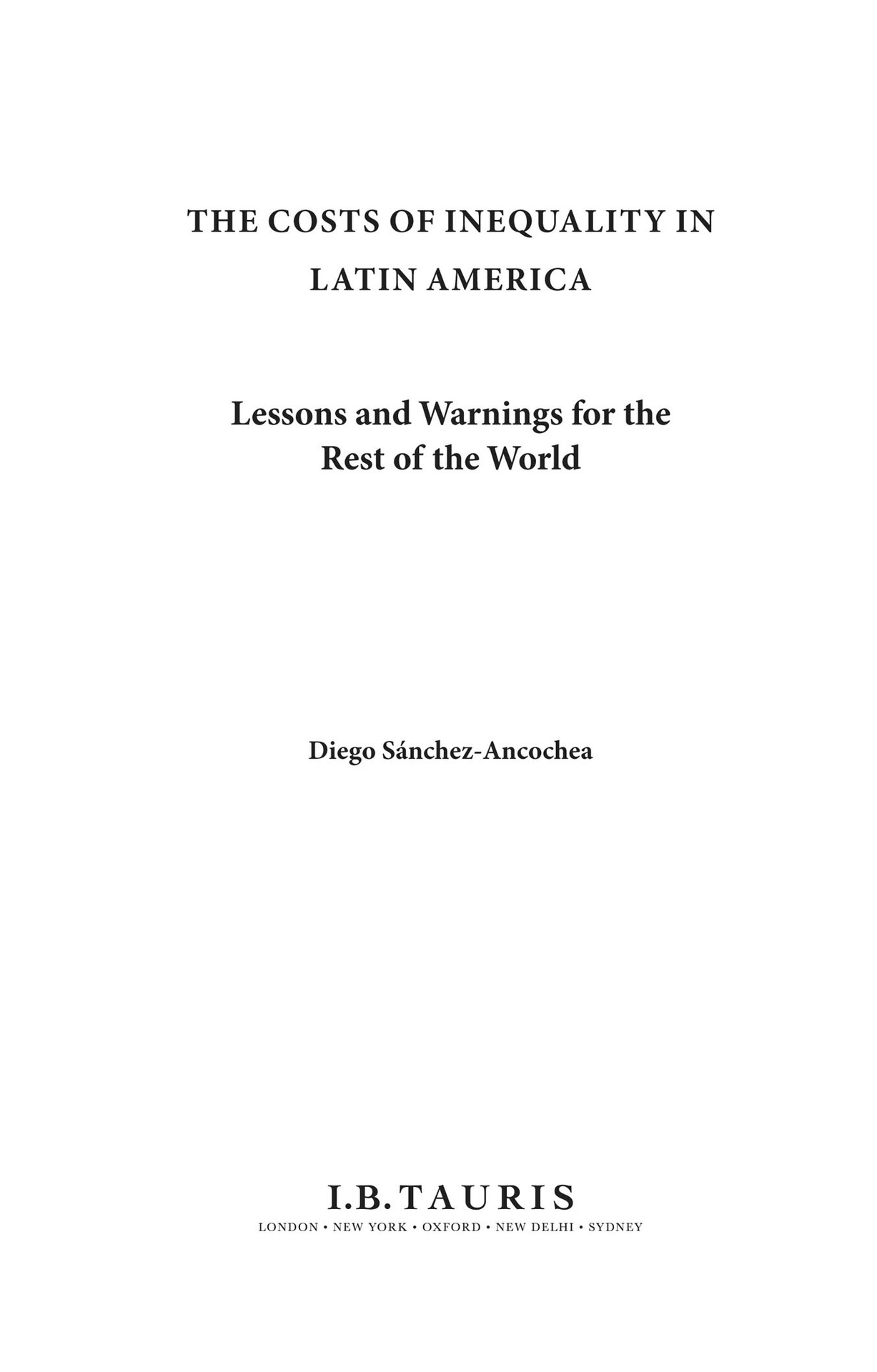THE COSTS OF INEQUALITY IN LATIN AMERICA
Diego Snchez-Ancochea is Head of the Oxford Department of International Development and Professor of the Political Economy of Development at the University of Oxford
CONTENTS
At the time of writing the final pages of this book, the world is in the midst of an unexpected health and economic catastrophe created by the outbreak of the COVID-19 pandemic. In recent months, many of us have been in a lockdown that has saved millions of lives while also creating significant economic collateral damage. When this book is finally out, most people will still be focused on the implications of the pandemic for their lives, their countries, and the whole world. There is a risk that we stop paying attention to problems like inequality that just months earlier were at the heart of the public agenda.
This reaction would be understandable but mistaken. In fact, the pandemic is likely to exacerbate the concentration of income and power, further threatening our democracies and challenging our economic model. It is thus even more important than ever to consider the costs of income inequality and debate the ways to overcome it. To do so, the historical experience of Latin Americaa continent with more than 600 million people and four times the size of the European Unionwill be particularly relevant.
Given the growing challenge that inequality poses, academics must make an effort to go beyond university walls and participate in public debates. This book is my first attempt to do so. I could not have done it without my wife Rosas unremitting backing. She encouraged me to write a book for a general audience, supported my sabbatical plans enthusiastically, and patiently listened to my worries and concerns.
Three friends supported this project from beginning to end. Jill Hedges was instrumental in the initial phases. She liked my original idea, put me in touch with her publisher, and commented on early draftsmaking sure that I did not make glaring mistakes in my discussion of Pern! Salvador Mart i Puig read the full manuscript, making thorough suggestions and providing additional readings. Thanks to him (and to Ben Phillips) I ended up writing Chapter 6 on Latin Americas positive lessons. I hope we can together write our planned sequel to this book in Spanish. Juliana Martnez Franzoni has been my coauthor and close friend for many years. Much of what I have written here, particularly about social policy, results from hours of hard work and fun conversations with her.
Others read either the full draft or at least some chapters. I thank my aunt Margarita Snchez Castilla and my sister Milagros Snchez Ancochea as well as Ludovic Arnaud, Ana de Vicente Lancho, Mateo Garca Cabello, Ben Phillips, and Pablo Snchez-Blanco for their constructive comments and appreciation of the project. Geoff Goodwin deserves a special mention: during the editing phase, he commented on several chapters at lightning speed.
I wrote the book while spending a sabbatical year at the Kellogg Institute for International Studies. It is hard to imagine a more welcoming place: everything there is organized to make the life of its fellows easy and productive. I thank all its staff, particularly its director Paolo Carrozza, its managing director Sharon Schierling, and its fantastic assistant director Denise Wright for all their support. Being at the Kellogg also gave me the opportunity to share time with a unique group of visiting fellows. With two of them (Ben Phillips and Vicky Paniagua) and with Ray Offenheiser I co-organized a conference on inequality and democracy that helped develop some of my thinking for the book.
At Notre Dame, I also had the opportunity to present the books argument at the Higgins Labor Program lunch seminar series. I am thankful to its director, Daniel Graff, for the opportunity and for great conversations on inequality, labor rights, and social justice over lunch and dinner. I was also invited to discuss parts of the book in the International Seminar Culture and the SDG at the Universidad Tecnolgica de Bolvar in Cartagena, the Labour Party constituency of Banbury and Bicester, the MA in Development Strategies and Technologies in Madrid, Mount Holoyke College in the United States, and the universities of Chile and Helsinki. I am very grateful to participants in all these events for their comments and to the following friends and colleagues for their invitation: Jos Miguel Ahumada, Jos Antonio Alonso and Iliana Olivi, Tania Jimnez and Lizzette Robleto, Jussi Pakkasvirta, and Eva Pausalways a great source of ideas and inspiration. Agenda Pblica also provided a unique opportunity to publish some of my ideas on inequality, democracy, and Latin America, and I thank Marc Lpez for it.
I could not have written this book without the sabbatical leave given by the University of Oxford. Over more than a decade, the Latin American Centre and the Oxford Department of International Development (ODID) have been great homes, full of interesting, committed, and supportive colleagues. Much of what I know about inequality comes from discussions with them. In the last few months I have had the pleasure to head the ODID; I appreciate its staffs patience in the run-up to the books submission. Outside Oxford, I have benefited from endless support over many years from Maxine Molyneux and Ken Shadlen.
Joanna Godfrey from I.B. Tauris/Bloomsbury encouraged the idea from the very beginning. I am thankful to her and to Olivia Dellow for their support in every step of the process. Two anonymous referees also provided useful comments. I also thank Robert Davies for his great copy-editing job.
My interest in inequality and development comes from my parents Diego and Milagros. They made sure that my sister Milagros, my brother Ramn, and I understood how much the world has to change and that we embraced the need to contribute to a more just world. This is a great opportunity to acknowledge the support the four of them have always given me.
My wife Rosa and my daughters Silvia and Maya have shown great patience while I was writing this book. They always make life interesting. Rosa is one of the most creative, supportive, and brave people I know. Her commitment to fighting all kinds of inequality is inspiring. Silvia is one of the most thoughtful and critical teenagers I have ever met (of course I am biased!) and Maya is daily fun. I dedicate the book to the three of them.
Occupy Wall Street, anti-austerity protests in Spain and Greece, the electoral successes of Trump, Salvini, Erdogan, and Brexit, the 2008 financial crisis, the casualization of work We thought that the first two decades of the twenty-first century had been turbulent and then the COVID-19 outbreak made things even more complicated. The world seems to be in a continuous state of shock, with millions of people struggling.
Although poverty has been reduced in many countries and the world is wealthier than ever, a growing number of people are discontented. They see the rich becoming richer and worry about their own stagnant living standards. Many believe their children will fare worse than them, suspect that the economy is rigged, and doubt that politicians will do much to change things. The pandemic may have diverted our attention in the short run, but it is likely to make things worse, creating even larger income gaps.
The growing instability in the face of inequality is unsurprising for those of us who study Latin America. We know well the catastrophic consequences of the concentration of income and opportunities in a few hands. In Latin Americaone of the most unequal regions in the worldinequality has historically contributed to many social ills, from low economic growth to weak democratic institutions and high levels of violence. Populism, financial crises, bad jobs, social polarization: Latin America has struggled with all these problems for more than a century.


